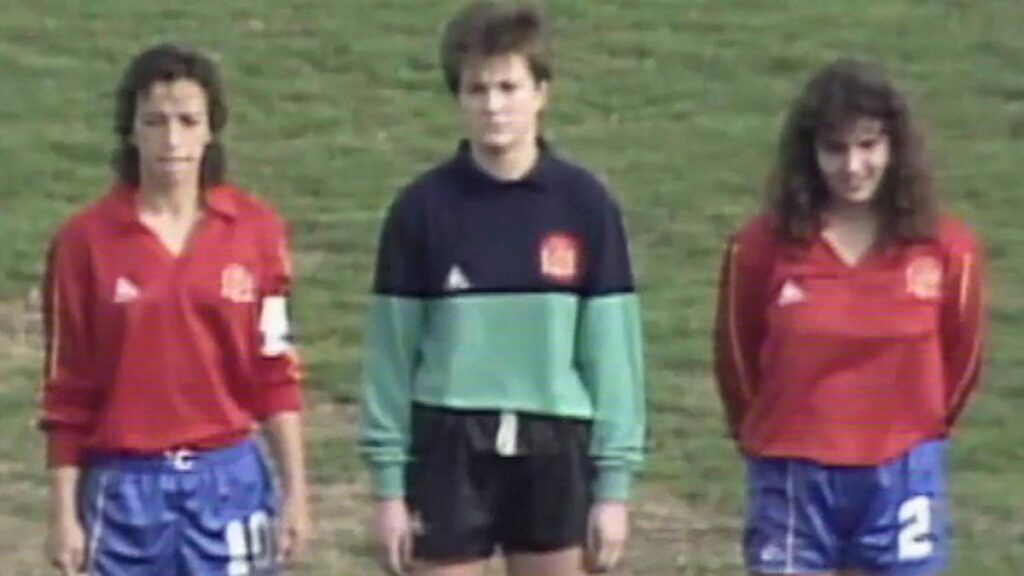
Spain begins this Thursday its participation in the Women You have to go back 54 years ago. A path that began in hiding, crossed institutional and social contempt, and opened slowly between prejudices. This episode has been commemorated by RTVE in its program 'Vintage connection'. 1983-2023: The path of the champions with Teodoro Nieto, Natalia Pablos and Paco Grande as guests.
Although The first official game was not played until 1983the story started much earlier. It was in 1971 when, regardless of the Royal Spanish Football Federation, a team promoted by Rafael Muga was organized. That group of women played their first meeting in La Condomina (Murcia) against Portugal. There was no hymn, there was no shield, or just press. Women's football was not recognized by institutions at that time.
Between 1971 and 1972, the National Team played at least six games, some in Italian cities such as Udine or Padua, where They came to play against more than 40,000 people. On the other hand, in Spain these YL meetings were barely mentionedAs players suffered the rejection of society.
We were a selection of great talent, but we were just filming
Hostility in the first years
For years, the RFEF systematically ignored women's football. Only when UEFA began to press the National Federations to promote the participation of women in sport, there was a small change. In 1980, the RFEF accepted the creation of a female section. The process culminated in December 1982 with the appointment of Teodoro Nieto as the first national coach official. Nieto, then room soccer technician, assumed the task without previous references but will be able to build from scratch.
The training began in the countryside of Pegaso, in Madrid. But the context remained certainly hostile. Years later, Nieto himself confessed in private what was happening in those early days: “Those workouts let kids come from a school or institute to see us. They told everything about the girls to get to get dike: that if he looks that ugly is that, that if they throw his tits. It was very hard for these women to decide to be soccer players in those years. ”
Teodoro Nieto directed the first training after the selection by the RFEF was formalized.
The official debut of the National Team took place on February 5, 1983 in La Guardia (Pontevedra)in a friendly against Portugal that resulted in 0-1 defeat. That party marked the official start of the national team.
First official victory
The first years were difficult. Spain took five friendly matches to achieve its first victory, which arrived in Switzerland on May 12, 1984. Also against the Helvetic, in June 1986, the first triumph was signed in the official party (0-3). We had to wait until December 1987 to celebrate the first official victory on national soil: It was in Aranjuez, against Belgium, with a goal by Eli Artola in the last minutes.
Teodoro Nieto was clear from the beginning: “We were a selection of great talent, but we were just filming. The important thing for me and my technical team were not the results, but to build a selection. “
Conchi Amancio's case
Many of the best players in the country played in foreign leagues And yet, during the first years they were not summoned. In fact, the world's best player by the Italian coach (league where he played), Conchi Amancio, He never officially played with the selection. “It seems that they completely ignore me. They can't say that trips cost me because they have never questioned me. I I would have been able to pay me the trip to go to play with the Spanish team“The footballer said at that time.
At that time the closeness, availability and possibility of going to trainingalthough that meant leaving out the most prominent.
The most outstanding players at that time they played outside Spain were not summoned for prioritizing proximity.
That first official group, between 1983 and 1988, He could not qualify for any great tournamentbut left the seeds of a female football culture planted that was growing slowly. Over the years, other generations would collect that legacy and take it further. The culmination of that path occurred August 20, 2023, when Spain conquered the World Cup in Sydney.





